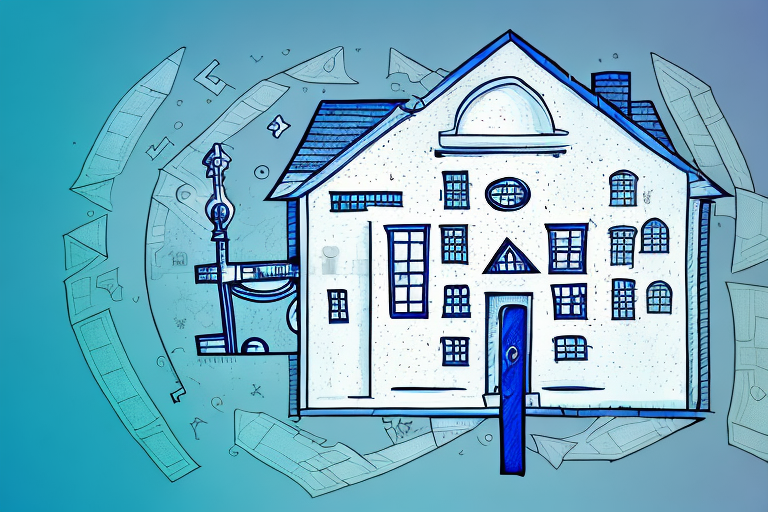Whether you’re a first-time home buyer or a seasoned investor, the goal of any real estate purchase is to maximize your return on investment (ROI). But achieving this goal isn’t always easy. There are many factors that can affect your ROI, from the condition of the property to the state of the local housing market. Fortunately, by following the strategic home buying tips outlined in this article, you can increase your chances of making a smart and profitable purchase.
“Understanding Return on Investment (ROI) in Real Estate”
To maximize your ROI, it’s essential to understand what it is and how it’s calculated. In general, ROI is a measure of how much money you’ll earn or lose on a particular investment relative to the amount of money you initially put into it. In real estate, ROI is often expressed as a percentage, and it takes into account factors such as property appreciation, rental income, and expenses like property taxes and maintenance costs.
When investing in real estate, it’s important to consider the long-term benefits of owning property. Real estate has historically been a stable investment, and owning property can provide a source of passive income for years to come. Additionally, real estate can act as a hedge against inflation, as rental income and property values tend to rise over time.
“The Importance of ROI in Home Buying”
When it comes to home buying, ROI is especially crucial. Unlike other investments like stocks or bonds, a home is both an asset and a liability. While it can appreciate in value over time and provide a source of rental income, it also requires ongoing maintenance and upkeep. Therefore, understanding your potential ROI is essential to ensure that you’re making a wise financial decision.
When considering the ROI of a potential home purchase, it’s important to factor in the potential for future appreciation. A home in a desirable location or in a neighborhood that is undergoing revitalization may have a higher potential for appreciation than a home in a less desirable area. Additionally, homes that require minor cosmetic updates may be undervalued, providing an opportunity for a higher ROI in the future.
“Calculating ROI for Residential Properties”
Calculating potential ROI is an important step in the buying process. To do so, you’ll need to factor in the property’s purchase price, your anticipated rental income, and any expenses associated with owning and maintaining the property. To give you a clearer picture, consider using an online ROI calculator or consulting with a financial advisor or top buyer’s agent.
When calculating ROI, it’s important to consider both short-term and long-term factors. Short-term factors may include any upfront renovation or repair costs, as well as potential rental income. Long-term factors may include the potential for appreciation, as well as ongoing maintenance costs.
“Factors Affecting ROI in Real Estate”
Several factors can impact your potential ROI when buying a home. Some of the most significant factors to consider include the local housing market, the condition of the property, and any upfront renovation or repair costs. Working with a top buyer’s agent can help you identify these factors and make a smart investing decision.
Other factors to consider when evaluating the potential ROI of a property include the neighborhood, school district, and proximity to amenities such as shopping, dining, and public transportation. Additionally, the overall condition of the property can impact its potential for appreciation and rental income.
By taking the time to evaluate the potential ROI of a property, you can make a smart investment decision that will provide long-term benefits. Whether you’re a first-time homebuyer or an experienced real estate investor, understanding ROI is essential to achieving your financial goals.
“Choosing the Right Buyer’s Agent”
One of the most critical decisions you’ll make when buying a home is choosing the right buyer’s agent to guide you through the process. A top buyer’s agent can offer invaluable expertise and insight, working on your behalf to find the perfect property for your needs and budget.
Buying a home can be a complicated and overwhelming process, especially if you’re a first-time homebuyer. That’s why it’s essential to have a buyer’s agent who can help you navigate the process and make informed decisions every step of the way. A buyer’s agent can provide you with access to exclusive listings, help you understand the local market conditions, and negotiate on your behalf to get you the best possible deal.
“The Role of a Buyer’s Agent”
A buyer’s agent is responsible for representing your best interests in the home buying process. They’ll help you identify properties that meet your needs and budget, negotiate with sellers and their agents on your behalf, and ensure that you’re getting the best value for your investment.
One of the most significant advantages of working with a buyer’s agent is that they are legally obligated to act in your best interests. They have a fiduciary duty to you, which means that they must put your interests ahead of their own. This ensures that you have someone on your side who is looking out for your best interests at all times.
“Qualities of a Top Buyer’s Agent”
Some of the key qualities to look for in a top buyer’s agent include local market expertise, strong negotiation skills, and a commitment to providing exceptional customer service. They should be able to anticipate your needs, offer personalized advice, and leverage their experience and connections to help you achieve your goals.
Local market expertise is essential when choosing a buyer’s agent. They should have a deep understanding of the local real estate market, including current trends, pricing, and inventory. This knowledge can help you make informed decisions and ensure that you’re getting the best possible value for your investment.
Strong negotiation skills are also critical when choosing a buyer’s agent. Your agent should be able to negotiate effectively on your behalf, whether you’re making an offer on a property or negotiating repairs after a home inspection. This can help you save money and ensure that you’re getting the best possible deal.
“How to Find and Interview Potential Buyer’s Agents”
When looking for a buyer’s agent, consider asking for referrals from friends, family, or colleagues who have recently bought a home. You can also find agents through online searches, professional organizations, and real estate websites. When interviewing potential agents, be sure to ask about their experience, their approach to the home buying process, and their availability.
Experience is an essential factor to consider when choosing a buyer’s agent. You want someone who has a proven track record of success in helping buyers find and purchase homes. Ask about their experience working with buyers in your price range and preferred location.
Another critical factor to consider is the agent’s approach to the home buying process. Do they take a hands-on approach, working closely with you to find the right property? Or do they take a more hands-off approach, leaving you to do most of the work? Make sure you choose an agent whose approach aligns with your needs and preferences.
Finally, make sure you choose an agent who is available when you need them. Buying a home can be a time-consuming process, and you want an agent who is responsive and available to answer your questions and provide guidance when you need it.
Overall, choosing the right buyer’s agent is a critical step in the home buying process. Take the time to research and interview potential agents to find someone who has the experience, expertise, and commitment to help you find the perfect home for your needs and budget.
“Strategies for Finding the Perfect Property”
Once you have a trusted buyer’s agent on your side, it’s time to start searching for the perfect property. A successful property search requires careful research, consideration, and a clear understanding of what you’re looking for.
“Researching the Local Market”
Before you start viewing potential properties, it’s important to research the local real estate market to get a better sense of what’s available within your budget. This research can help you understand the current trends in the market, including price trends, inventory levels, and how long homes are on the market.
One way to research the local market is to attend open houses in the area. This can give you a firsthand look at the properties available and help you get a sense of the local market. You can also speak with local real estate agents to get their perspective on the market and to learn about any upcoming developments or changes in the area that could affect property values.
“Identifying High-Growth Areas”
If you’re interested in an investment property, it’s important to identify areas where property values are likely to appreciate over time. Look for areas with growing job markets, strong economic fundamentals, and a high demand for housing.
For example, if you’re looking to invest in a rental property, you may want to consider areas with a high demand for rental housing. This could include areas with large universities or growing tech industries. These areas may also have a high number of young professionals who are looking for rental properties.
“Evaluating Property Types and Features”
When evaluating properties, it’s important to consider your short and long-term goals. Are you looking for a fixer-upper that you can flip for a profit, or a turnkey rental property that requires minimal maintenance?
Top buyer’s agents can help you weigh the pros and cons of different property types and features to find the best fit for your needs and budget. For example, if you’re looking for a rental property, you may want to consider properties with multiple bedrooms and bathrooms, as these tend to be more attractive to renters.
It’s also important to consider the location of the property. Is it in a desirable neighborhood with good schools and amenities? Is it close to public transportation or major highways? These factors can all affect the value of the property and its potential for appreciation over time.
In conclusion, finding the perfect property requires careful research, consideration, and a clear understanding of your goals and budget. By working with a trusted buyer’s agent and taking the time to evaluate different properties and features, you can find a property that meets your needs and helps you achieve your real estate goals.
“Negotiating the Best Deal”
Once you’ve identified your ideal property, it’s time to negotiate the best possible deal. To do so, you’ll need to understand market value, analyze comparable sales data, and leverage effective negotiation techniques.
“Understanding Market Value and Pricing”
Market value is the price that buyers and sellers agree upon based on supply and demand factors. To understand market value in your area, work with your agent to conduct a comparative market analysis (CMA), which compares the price of your target property to similar properties that have sold recently in the same area.
“Leveraging Comparable Sales Data”
Comparative sales data can be a useful tool when negotiating a property purchase. By analyzing recent sales of similar properties in the area, you can gain insight into fair market value and identify areas where you may be able to negotiate a better price.
“Effective Negotiation Techniques for Home Buyers”
To negotiate the best deal possible, consider tactics like offering a lower initial price, requesting concessions like repairs or closing costs, or leveraging your agent’s negotiating skills.
“Conclusion”
Maximizing return on investment in real estate requires careful consideration, research, and expert guidance. By working with a top buyer’s agent and following the strategic home buying tips outlined in this article, you can increase your chances of making a smart and profitable investment. Remember to calculate potential ROI, choose the right agent, and carefully evaluate properties before making an offer. With the right strategy in place, you can achieve financial success and secure your dream home for years to come.







